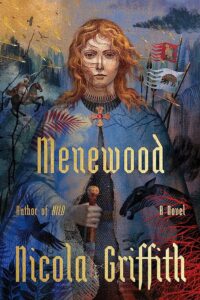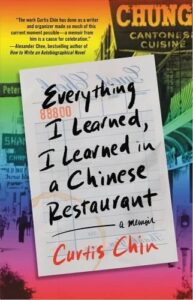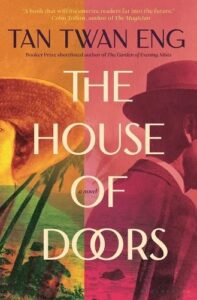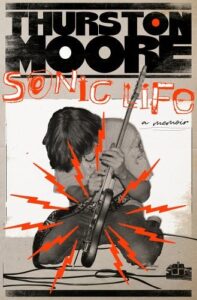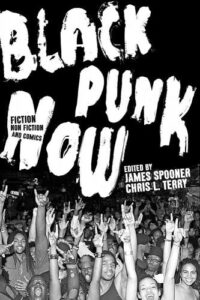OCTOBER
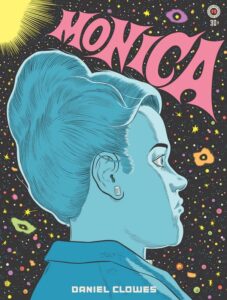
Daniel Clowes, Monica
Fantagraphics, October 3
New Daniel Clowes! ‘Nuff said, really, but if you need details, the latest book from the author of Ghost World is being described as a “genre-bending thriller” and also “a multilayered masterpiece in comics form that alludes to many of the genres that have defined the medium—war, romance, horror, crime, the supernatural, etc —but in a mysterious, uncategorizable, and quintessentially Clowesian way that rewards multiple readings.” Can’t wait. –ET

Jonathan Lethem, Brooklyn Crime Novel
Ecco, October 3
The latest novel from the bard of Brooklyn is a metafictional collage that tells the story of some fifty years in one neighborhood (roughly Cobble Hill). It’s funny and wise and weird, and populated with chapter titles like How Much for the Dog? (1979) and No Name White Boys (generally) and Lies (whenever and wherever lies appear) and Having a Nemesis (subliminal). Having recently left the city, this love letter to Brooklyn is just what I need. –ET

Jesmyn Ward, Let Us Descend
Scribner, October 3
Two-time National Book Award winner Jesmyn Ward is back, after a six-year absence, with a reimagining of American slavery set in the years leading up to the Civil War. Let Us Descend is the story of Annis, an enslaved girl sold off by the plantation owner who fathered her, who serves as the reader’s guide through the nightmarish landscape of the 19th-century American South, as well as the spirit world beyond. Ward’s 2017 novel Sing, Unburied, Sing, and her 2013 memoir Men We Reaped, are two of the most stirring, painful, beautiful works of that decade; I think about them both often and cannot wait for her latest. –DS

Will Hermes, Lou Reed: The King of New York
FSG, October 3
It’s been ten years since Lou Reed died; there are worse ways to mark the anniversary than reading this book by Rolling Stone writer Will Hermes, author of Love Goes to Buildings on Fire, described by its publisher as “the definitive narrative of Reed’s life and legacy, dramatizing his long, brilliant, and contentious dialogue with fans, critics, fellow artists, and assorted habitués of the demimonde.” For lovers of Lou Reed and New York City alike. –ET
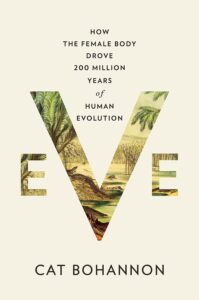
Cat Bohannon, Eve: How the Female Body Drove 200 Million Years of Human Evolution
Knopf, October 3
This promises to be an extremely informative, comprehensively researched encapsulation of the female form throughout time. Too often overlooked, and under-investigated (women were only required to be in clinical trials starting in the 80s), Eve offers itself as a corrective, a revision to the historically male-centered way of viewing the body. –JH
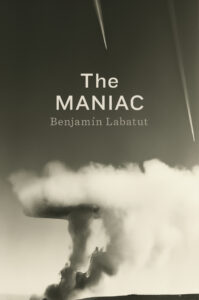
Benjamin Labatut, The MANIAC
Penguin Press, October 3
Labatut’s English language debut is portrait of John von Neumann—a polymath who invented game theory and the first computer, AI, and cellular automata. It’s voiced by a chorus of his wives, friends, colleagues, and enemies, structured in a tryptic spanning a hundred years. Blurring the lines of historical fact and fiction, there’s never been a timelier moment to explore the growth of artificial intelligence and the dangerous possibilities of our most likely future. –EF
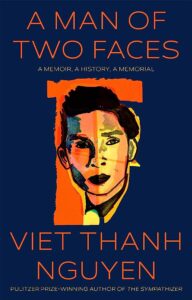
Viet Thanh Nguyen, A Man of Two Faces: A Memoir, A History, A Memorial
Grove Atlantic, October 3
Viet Thanh Nguyen’s debut novel, The Sympathizer, became a near-instant sensation upon its release in 2015. It won 2016 Pulitzer Prize for Fiction (as well as a drift of other major literary awards), sold over a million copies, and has now been adapted for the screen as a HBO miniseries (set to air in 2024). In the seven years that followed, Thanh Nguyen published two works of nonfiction, a collection of short stories, and a sequel to The Sympathizer—all to critical acclaim.
Now, with his first memoir, the Guggenheim and MacArthur fellow utilizes the biting wit and probing intellect so resonant in his fiction to reflect upon ideas of refugeehood, colonization, and the relationship between Vietnam and America—all through the prism of his own experience as a child refugee, son, and father. –DS
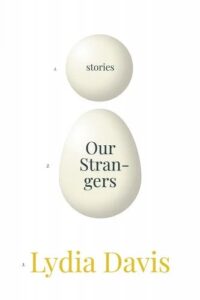
Lydia Davis, Our Strangers
Bookshop Editions, October 3
The new Lydia Davis collection, Our Strangers, is the first and thus far only title published by Bookshop, the Amazon alternative that supports local bookstores. In keeping with Bookshop’s ethos, Our Strangers will only be available at independent bookstores and libraries, a laudable gesture toward loosening Amazon’s chokehold on bookselling. In Our Strangers, Davis—the reigning queen of flash fiction— does what Davis does best, compiling another collection of sweet, short, punch-to-the-heart pieces of writing. Often only one paragraph in length, or a couple lines of dialogue, these stories tell of mundanity with a poet’s eye for meaning. –JH

Melissa Broder, Death Valley
Scribner, October 3
The premise alone makes it impossible for me to not read this book. A grieving woman flees to the California high desert and therein discovers a giant, mystical cactus with a door-sized gash on its side that beckons her to enter. After the success of The Pisces and Milk Fed, both of which are set to be adapted for the screen, Broder’s third novel, “born out of my father’s six-month stay in the ICU prior to his death, and my inability to escape the experience of being human on a stretch of Highway 15 between Los Angeles and Las Vegas,” seems likely to be one of the most high-profile releases of the fall. –DS
NICOLA GRIFFITH, MENEWOOD
MCD, OCTOBER 3
As previously recommended: Ten years after the publication of Hild, Griffith’s beloved retelling of the life of Hilda of Whitby, we’re finally getting a sequel, in which Hild is all grown up and building her stronghold in the titular Menewood—but war is coming, and Edwin needs her yet again. Middle Ages, here I come. –ET
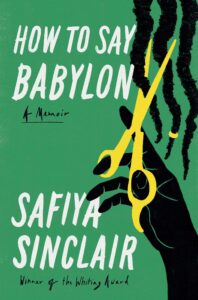
SAFIYA SINCLAIR, HOW TO SAY BABYLON
SIMON & SCHUSTER, OCTOBER 3
As previously recommended: If you haven’t read Safiya Sinclair’s poetry collection, Cannibal, yet, you should do that immediately. You will fall in love with the way she wields language, with her ability to conjure history and turn myth in on itself, and then you will undoubtedly understand why it’s so exciting that her memoir will be gracing us with its presence this summer. In How to Say Babylon, Safiya Sinclair explores her strict Rastafarian upbringing, examining her relationship with her controlling father. Under his roof, women were to be obedient and to not have opinions. So it was a lifeline when her mother started sharing books, especially poetry, with her children. This memoir is a story of rebellion, culture clash, and a love letter to the curative powers of literature. In Cannibal, Safiya Sinclair draws heavily on Genesis and the story of Eve; How to Say Babylon is a writing of her own origin story. –Katie Yee, Associate Editor (emeritus)

Roxane Gay, Opinions
Harper, October 10
Unless you’ve been living under a rock for the past ten years (if so, good for you), you’ve read Roxane Gay’s cultural criticism and don’t need me to tell you that a 300-page collection of her work—ranging in topic from civil rights to (very funny) workplace etiquette—is worth anticipating. I have a vivid memory of returning to my hotel room after an exhausting conference in 2015 and electing to spend several hours reading Bad Feminist instead of drifting off into post-panel oblivion, which is a ringing endorsement from me, an introvert who loves sleep. –ES

Justin Torres, Blackouts
FSG, October 10
After twelve long years, we’re finally getting a second novel from Justin Torres, whose We the Animals has become a well-loved contemporary classic. Torres has always been a beautiful, immersive writer, but his already considerable powers have clearly expanded in this book, which centers around a mysterious text, whose partially blacked-out pages are doled out as we read, along with other art and artifacts of messy and glorious life, as part of the stories two men tell about themselves and each other. –ET
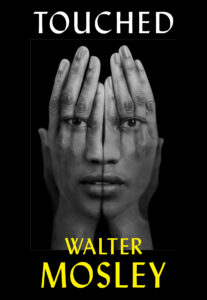
Walter Mosley, Touched
Grove, October 10
Dystopian fantasy with an edge of satire from one of the best to ever do it? Yes please. Though we live in an era that often feels beyond parody, Walter Mosley’s story of one Black man’s otherworldly defense of his family—surrounded as it is by the whiteness of the Hollywood Hills—feels truer than most Fox News headlines. –JD
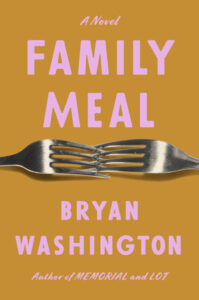
Bryan Washington, Family Meal
Riverhead, October 10
Bryan Washington returns to familiar themes and settings in Family Meal: love, sex, grief, food, against the backdrops of Houston and Osaka. I love when authors do this—write what they know, and where they know, but with different iterations and new characters, even if they have similar preoccupations and habits. Writing about food is something Washington does so well, creating vivid expressions of care and lineage and ancestry in the meals characters prepare for one another. Family Meal is about two best friends reuniting in their hometown after one experiences the death of a partner. Washington writes about loneliness and despair with the kind of care I crave; instead of dipping into nihilism, his characters continue to try and understand one another. Even if there is turning inward, there is always turning toward, a constant reaching, reaching. –JH
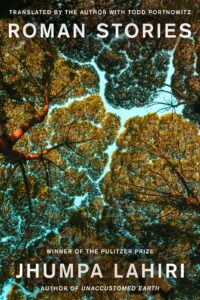
Jhumpa Lahiri, tr. Todd Portnowitz, Roman Stories
Knopf, October 10
In her first short story collection since 2008’s Unaccustomed Earth, Lahiri returns with stories that were written in Italian (she translated them alongside editor Todd Portnowitz). Lahiri’s stories are often undramatic, seemingly quiet, with interior transformations acting as the crux of the drama. Here, many of the stories probe the experience of immigrants in Rome, and as we follow those on the margins of society, we learn something not only about Rome, but ourselves. –EF
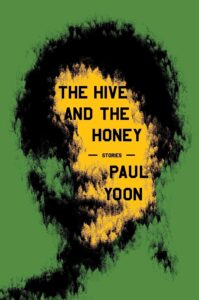
Paul Yoon, The Hive and the Honey: Stories
Simon Element, October 10
The third short story collection (his first since 2017’s The Mountain) from Young Lions Fiction Award-winner and Guggenheim fellow Yoon spans cultures and centuries, roving from small town New York, where a formerly incarcerated man tries to start a new life, to the Edo Period in Japan, where a Samurai escorts an orphan boy back to his countrymen. Yoon’s 2020 novel-in-stories Run Me to Earth—a subtly devastating panoramic portrait of three lives displaced by war—was one of the standout books of that year, so I’m pretty damn excited for this one. –DS

Werner Herzog, tr. Michael Hofmann, Every Man for Himself and God Against All: A Memoir
Penguin Press, October 10
I am beside myself with anticipation for this, the first ever memoir (with apologies to 2004’s Conquest of the Useless: Reflections from the Making of Fitzcarraldo) from one of the most singular filmmaking talents, and personalities, in the history of the medium. From his impoverished childhood in war-torn Germany to his outlandish adventures chasing oddballs and outcasts across seven continents, Every Man for Himself and God Against All (magnificent title, of course) promises to take us inside the mind and memory of a man whom Roger Ebert described thusly: “has never created a single film that is compromised, shameful, made for pragmatic reasons, or uninteresting. Even his failures are spectacular.” –DS
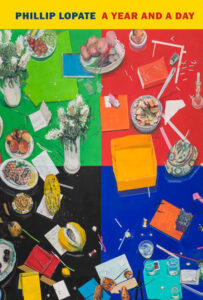
Phillip Lopate, A Year and a Day
NYRB, October 10
Phillip Lopate is considered a “grandfather” of the personal essay (which begs the question, who’s the grandmother?), which might give the impression that he’s authoritative and aloof, a kind of modern Montaigne writing away in his tower. That is resolutely not the tone to expect from his new collection, grown out of a yearlong series of blogs he wrote for The American Scholar, which had me laughing in the introduction alone. “I had no idea how many ‘hits’ the blog was getting and I did not want to know,” he writes. “It suited me fine to think that no one was reading it, expect for a few loyal friends or desperate souls who needed to get a life.” More blogs by our literary forebears, please! –ES
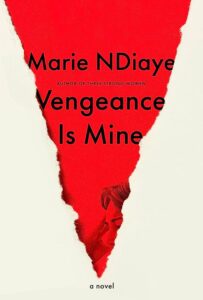
Marie NDiaye, Vengeance Is Mine
Astra House, October 17
In Marie NDiaye’s sinister and spellbinding new novel, a lawyer is hired by the husband of a woman accused of murdering her three children, despite her lack of experience in high-profile trials. Meeting him unlocks memories for her of a childhood visit to a palatial home, perhaps occupied by the husband’s family, and wonders if she perhaps met her new client when she was 10 and he was 15. But what happened between them? And why can’t she remember the details? Half suspense novel, half dark fairy tale, Vengeance is Mine is a literary tour-de-force. –MO
Curtis Chin, Everything I Learned, I Learned in a Chinese Restaurant: A Memoir
Little, Brown, October 17
In this first memoir by Chin—organizer, filmmaker, writer, and cofounder of the Asian American Writers’ Workshop—we’re dunked into the world of 1980s Detroit as most of us have rarely been seen before: from the windows of a Chinese restaurant, where a young boy is navigating a changing city, a large family, and his own identity. –ET

Molly McGhee, Jonathan Abernathy You Are Kind
Astra House, October 17
If you’re at all tuned into the publishing world, you recognize Molly McGhee as a former editor who left the industry last year and has been speaking out about the intersection of class and publishing. It was interesting to have that context in mind when reading her new book, “a debut novel for the modern working stiff.” It follows Jonathan Abernathy, a down-on-his-luck type who’s drowning in debt and takes a government job in the hopes of freeing himself, an unconventional gig that involves entering the dreams of middle-class workers and removing anything unpleasant so they can be better workers by day. It’s the spiritual sibling of Severance, but creepier. –ES
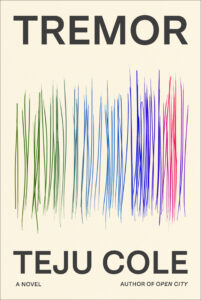
Teju Cole, Tremor
Random House, October 17
Cole’s first novel since his genre-bending 2011 wanderbook Open City focuses on Tunde, a West African man teaching photography “on a renowned New England campus” (dollars to donuts this is Harvard, where Cole teaches creative writing). The publisher describes the book as a startling work of realism and invention that engages brilliantly with literature, music, race, and history as it examines the passage of time and how we mark it. It is a reckoning with human survival amidst ‘history’s own brutality, which refuses symmetries and seldom consoles,’ but it is also a testament to the possibility of joy…Cole once again offers narration with all its senses alert, a surprising and deeply essential work from a beacon of contemporary literature.” I’m very curious to get another taste of Cole’s work. –ET
Tan Twan Eng, The House of Doors
Bloomsbury, October 17
It’s been eleven years since Malaysian novelist Tan Twang Eng’s last book, the bestselling and Booker Prize-shortlisted The Garden of Evening Mists. At last, he returns with a novel set in Penang in 1921, in which a declining Somerset Maugham descends on a couple who just might provide him with the literary inspiration he’s looking for. The publisher calls it “a spellbinding novel about love and betrayal, colonialism and revolution, storytelling and redemption,” and I am very much looking forward. –ET

Eskor David Johnson, Pay As You Go
McSweeney’s, October 24
I love a good urban odyssey—the more fantastical and madcap, the better. In Iowa Writers’ Workshop graduate Eskor David Johnson’s blazing, biting, richly imagined debut, a barber with a mysterious past embarks upon a quest to find the perfect apartment within the teeming chaos of the shape-shifting island city of Polis. A brilliantly surreal and vivid feat of imagination, Pay as You Go has already earned comparisons to Saul Bellow’s The Adventures of Augie March, Zadie Smith’s White Teeth, and Paul Beatty’s The Sellout. –DS
Thurston Moore, Sonic Life: A Memoir
Doubleday, October 24
Wanna look cool this fall (and/or fill the Just Kids-sized hole in your literary heart)? Pick up the memoir from Moore, founding member of Sonic Youth, which tells the story of his rise from small-town music fan to rock legend—and which by the way comes with a blurb from Colson Whitehead, who writes that “Thurston Moore has unearthed the missing links, the sacred texts, the forgotten stories, and the secret maps of the lost golden age. This is history—scuffed, slightly bent, plenty noisy, and indispensable.” –ET
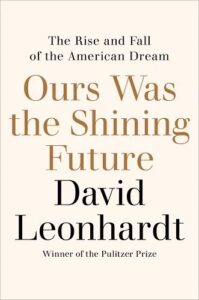
David Leonhardt, Ours Was the Shining Future: The Rise and Fall of the American Dream
Random House, October 24
Whatever happened to the American Dream? In this book, the Pulitzer Prize-winning columnist and senior writer at The New York Times David Leonhardt examines the current state of the American economy: polarized, stagnant, plagued by inequality, and rapidly losing any remaining optimism. “Americans used to believe that each new generation would live happier, healthier, better lives than the last, and this belief gave them pride in their country and faith in their institutions,” writes Walter Isaacson. “Now we are losing confidence in the American Dream, and along with it our generosity of spirit. Our politics is poisoned by anger and distrust. By explaining how we got to this critical moment, Leonhardt helps us understand how we can restore the American dream for all.” One can only hope. –ET

Dominique Routhier, With and Against: The Situationist International in the Age of Automation
Verso, October 24
We’re probably due a serious resurgence of Situationist thinking (I’m looking at you Gen Z TikTok): if ever we were living in a “society of spectacle,” this is it. And though more than a half century has passed since Guy Debord first raised the alarm about capitalism’s irradiation of culture, we have absolutely not come to terms with the rise of “cybernetics and automation.” More than mere history or intellectual recapitulation, though, With and Against simultaneously interrogates Situationist principles while also reframing them—urgently—for the dizzying spectacle that is the 2020s. –JD
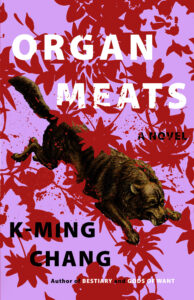
K-Ming Chang, Organ Meats
Random House, October 24
The latest novel from Kundiman fellow, a Lambda Literary Award finalist, and a National Book Foundation 5 Under 35 honoree K-Ming Chang, author of Bestiary and Gods of Want, gets even weirder than what we’ve come to expect from her, taking readers down a surreal path of myth and magic and girls who are dogs who are girls in gorgeous, lyrical prose. It also has a very cool cover. –ET

Mónica Ojeda, tr. Sarah Booker, Nefando
Coffee House Press, October 24
Mónica Ojeda’s twisted, strange, and compulsively readable English language debut Jawbone whetted my appetite for any horror she might concoct. Enter: Nefando, which tells the story of six young artists sharing an apartment in Barcelona who, in the parallel reality of a mysterious video game (Nefando), banish pain and trauma while becoming increasingly inured to taboos. –JG

Mary Beard, Emperor of Rome: Ruling the Ancient Roman World
Liveright, October 24
For history buffs and erstwhile toga partiers alike: a deep dive on the emperors of Rome—and the nature of the position itself—by popular literary historian and bestselling author of SPQR, Mary Beard. –ET
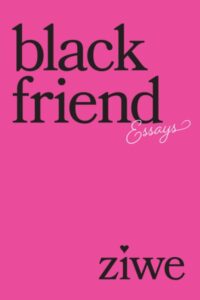
Ziwe, Black Friend: Essays
Abrams Image, October 24
For those devastated by the abrupt cancellation of the hit Showtime series Ziwe, never fear: eponymous host Ziwe Fumudoh is publishing her first book of essays this fall. Ziwe has carved out quite a niche voice for herself, contrarian and deadpan—she’s famous for asking celebrities on her show point-blank how many black friends they have, and then staring wide-eyed at them while they stutter and laugh and excuse themselves. It’s an extremely specific and compelling way of interviewing, one of the rare celebrity interactions we see that doesn’t seem highly choreographed. Her book of essays promises to give fans a healthy dose of the voice they know and crave from Ziwe; no matter which direction her career continues, Ziwe is undoubtedly a star worth paying attention to. –JH

Tim O’Brien, America Fantastica
Mariner, October 24
The first novel in two decades from National Book Award-winner Tim O’Brien (The Things They Carried) sounds like an absolute hoot. Billed as “[a] rollicking odyssey, in which a bank robbery by a disgraced journalist sparks a cross-country chase through a nation corroded by shameless delusion and deceit,” it’s the story of Boyd Halverson (the disgraced journalist turned bank robber) and Angie Bing (his unsuspecting but irrepressible hostage) and their multi-month flight/revenge mission, from California to Mexico to Minnesota, with just about every conceivable pissed-off pursuer on their tail. –DS
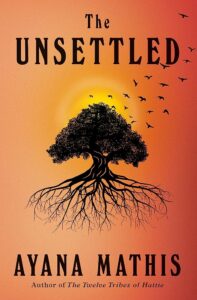
Ayana Mathis, The Unsettled
Knopf, October 24
Ayana Mathis’s 2012 novel The Twelve Tribes of Hattie was gripping and gorgeous (and Oprah-approved), and The Unsettled looks to be every bit as powerful. The multi-generational novel tells the story of Ava Carson, a single mother in 1980s Philadelphia, and her estranged mother in Bonaparte, Alabama as they fight to preserve their families and their history. Mathis is a masterful storyteller, and this novel promises to be as compelling as it is powerful. –JG
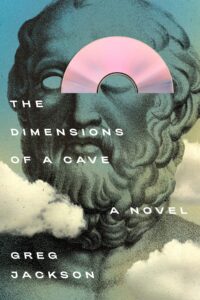
Greg Jackson, The Dimensions of a Cave
FSG, October 24
Greg Jackson, the author of an excellent short story collection, Prodigals, was listed as one of Granta‘s Best Young American Novelists in 2017, and yet it has taken until now for his debut—”a virtuoso journey into networks of power, our embroilment with new technologies, and the dangers of corruption” that “explores our drive toward war, violence, and venality, placing humanity and idealism under the spotlight”—to actually be published. I am anticipating that it will be worth the wait. –ET

Sandra Newman, Julia
Mariner, October 24
The Heavens was a life-sustaining read for me in the early pandemic, and I can’t wait to read the retelling of 1984 from the point of view of Winston’s lover, Julia. 1984 is, these days, more of a mangled political talking point than a book (apologies to Orwell), so I look forward to re-engaging with the text though Newman’s (feminist) retelling. –JG
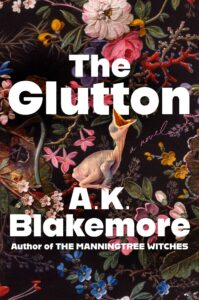
A.K. Blakemore, The Glutton
Scribner, October 31
I loved Blakemore’s devilish 2021 debut The Manningtree Witches, and her follow-up sounds just as demented/beguiling. The novel is inspired by the real figure of The Great Tarare, The Glutton of Lyon, a French showman in 18th century France, cursed with an insatiable appetite—an appetite that may or may not have led him to unspeakable acts. Excuse me when I say: fun! –ET
James Spooner and Chris L. Terry, eds., Black Punk Now
Soft Skull Press, October 31
A new anthology of fiction, nonfiction, comics, and art that seeks to showcase “all of the strains, styles, and identities of Black punk that are thriving,” as well as giving “newcomers to the scene more chances to see themselves” by decentering the whiteness that has long dominated the image of “punk.” Contributors include Hanif Abdurraqib, Mars Dixon, and Brontez Purnell. –ET
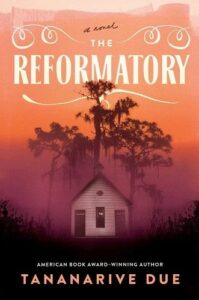
Tananarive Due, The Reformatory
Gallery/Saga Press, October 31
Tananarive Due is one of the greatest living horror writers, and her new book blends her signature style with an exploration into a very personal trauma: Due’s great-uncle was one of many Black children harmed by the Florida reform school known as the Dozier School for Boys, and The Reformatory takes readers into the nightmare that was the school circa 1950. Sure to be as powerful as it is haunting. –MO

Edward Carey, Edith Holler
Riverhead, October 31
Carey’s ninth book concerns a young girl who lives in—and in fact is never allowed to leave—a theater in Norwich in 1901. Reading about the city, and observing its denizens, but never venturing out into it, she begins to realize the city’s awful secret, even if no one will believe her. You can get a sneak peek of the illustrations in the book here. –ET


